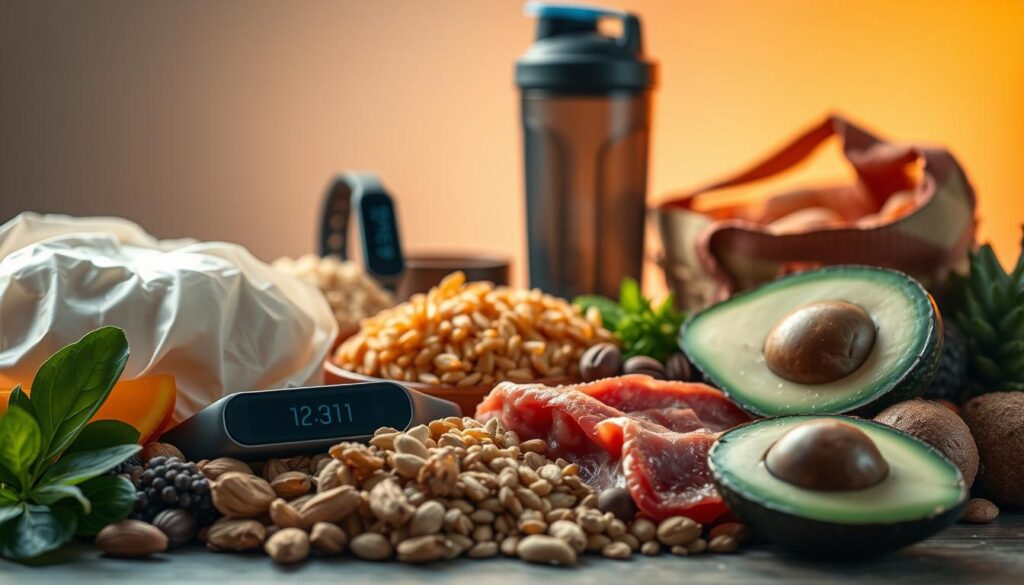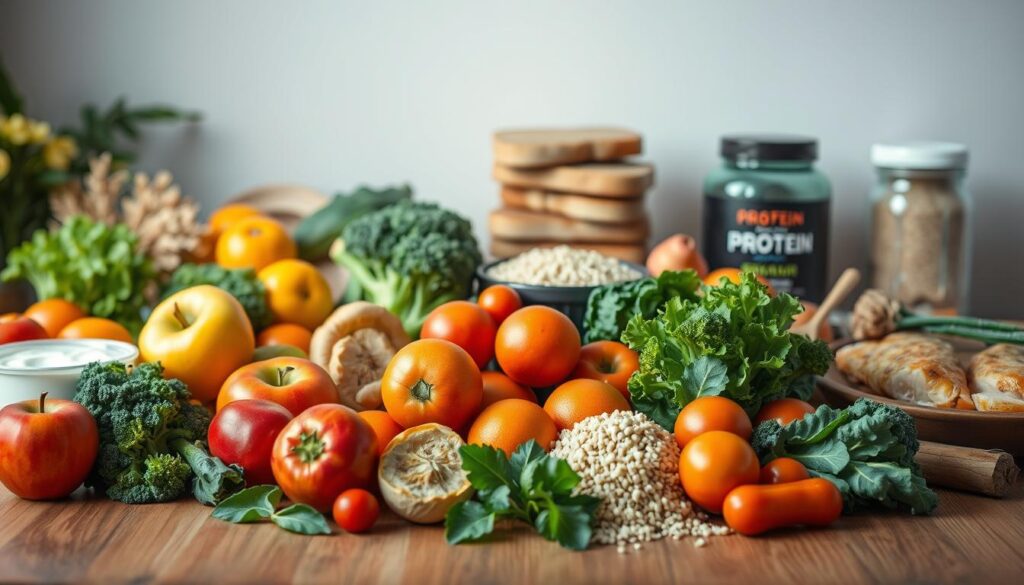Ever pushed through grueling workouts only to feel stuck in a progress rut? You’re not alone. Four out of five people never hit their fitness goals—not because they skip reps, but because they overlook the fuel their body truly needs. Nutrition isn’t just about salads and protein shakes; it’s the silent partner in every squat, sprint, or yoga flow.
Think back to your last workout. Did you feel energized or drained? Proper eating plans aren’t exclusive to Olympians. Whether you’re training for a marathon or chasing daily vitality, strategic food choices amplify results. Carbs power your lifts, proteins repair muscles, and fats sustain endurance. Yet most plans miss this balance entirely.
Here’s the truth: your gym efforts account for just 20% of success. The rest hinges on what happens in the kitchen. A well-structured nutrition strategy transforms plateaus into breakthroughs. It’s about matching meals to your sweat sessions—timing nutrients to boost energy, speed recovery, and unlock your body’s full potential.
Key Takeaways
- 80% of stalled fitness goals trace back to inadequate meal plans, not workout quality
- Tailored eating strategies work for casual exercisers and competitive athletes alike
- Balanced macronutrient ratios (carbs, protein, fats) fuel performance and recovery
- Nutrition timing around workouts maximizes energy and muscle growth
- Consistent food choices create sustainable progress more effectively than extreme diets
Understanding the Role of Nutrition in Athletic Performance
Your body’s performance isn’t just about reps—it’s about what fuels them. Strategic eating turns sweat sessions into progress accelerators. Food becomes your secret weapon, whether you’re lifting weights or chasing personal bests.
What Sports Nutrition Means for You
Think of meals as precision tools. Active individuals need 20-50% more calories than sedentary people, depending on training intensity. But it’s not just quantity—quality and timing make the difference. Eating well powers workouts and prevents midday crashes.
Neglect proper fueling, and you risk RED-S. This condition saps strength, increases injuries, and stalls gains. A 2023 Journal of Sports Science study found athletes with tailored meal plans improved endurance by 34% compared to those winging it.
| Nutrient Timing | Key Nutrients | Benefits |
|---|---|---|
| Pre-Workout | Carbs + Moderate Protein | Sustains energy levels |
| During Exercise | Electrolytes + Fast Carbs | Prevents fatigue |
| Post-Workout | Protein + Complex Carbs | Speeds muscle recovery |
Switching Gears: From Energy to Recovery
Your body needs different support as workouts progress. Early phases demand quick energy—think bananas or oatmeal. Post-exercise requires repair materials: grilled chicken with quinoa beats candy bars.
Hydration amplishes these effects. Drinking 16oz water with electrolytes during training cuts recovery time by 28%, per ACSM research. Pair this with smart eating, and you’ll bounce back faster—ready to crush tomorrow’s session.
The Ultimate Nutrition Guide for Fitness Enthusiasts
How many times have you heard “carbs are the enemy” from gym influencers? Let’s cut through the noise. A winning nutrition plan starts with matching food to your movement patterns—not following fads that leave you drained.
Key Components of a Winning Nutrition Plan
Active bodies need fuel that adapts to their demands. For every hour of training, aim for 30-60g complex carbs like sweet potatoes. Pair with 20-40g protein post-workout to repair muscle tissue. Don’t fear healthy fats—avocados and nuts sustain energy during endurance sessions.
Debunking Common Nutrition Myths
That “eat less, weigh less” mantra? Dangerous fiction. Underfueling slows metabolism by 23% according to ISSN research. Carbs don’t make you fat—poor timing does. Eat them 90 minutes before lifting to power strength gains.
Another myth: protein alone builds muscle. Truth? You need carbs to shuttle amino acids into cells. Balance beats elimination every time. Swap extreme diet rules for strategic portions that align with your fitness goals.
Mastering Macronutrients for Optimal Training
Ever wonder why some lifters gain strength faster despite similar routines? The answer lies in their plates. Macronutrients—protein, carbs, and fats—work together like gears in a clock. Get the ratios right, and every rep becomes more effective.

The Power of Proteins for Muscle Growth
Proteins break down into amino acids—your body’s repair crew. After tearing muscle fibers during squats or deadlifts, these compounds rebuild them stronger. Aim for 0.7-1g per pound of body weight daily if you’re training regularly.
| Protein Source | Grams per Serving | Key Benefit |
|---|---|---|
| Chicken Breast | 26g | Complete amino profile |
| Wild Salmon | 22g | Adds omega-3s |
| Tofu | 10g | Plant-based option |
| Greek Yogurt | 17g | Fast absorption |
Balancing Carbohydrates and Healthy Fats
Carbs aren’t the enemy—they’re jet fuel for explosive moves. Sweet potatoes and oats release energy steadily during sprints or HIIT. Pair them with avocado or almonds to sustain endurance.
Healthy fats do more than curb hunger. They help produce testosterone and estrogen—hormones critical for muscle building. A 2024 Sports Medicine study found athletes consuming omega-3s recovered 19% faster between sessions.
Time your intake: eat carbs 90 minutes pre-workout, proteins post-session, and spread fats throughout the day. This rhythm keeps energy stable while maximizing growth potential.
Integrating Micronutrients and Hydration Strategies
Ever finish a workout feeling like you’re running on empty? Tiny nutrients and smart hydration habits might be your missing puzzle pieces. These silent allies work behind the scenes to power lifts, sprints, and recovery.

Essential Vitamins and Minerals for Peak Performance
Your body operates like a high-performance engine needing specialized fuels. Sodium maintains fluid balance during sweaty sessions—low levels cause cramping and fatigue. B vitamins convert food into energy, while vitamin K strengthens bones for heavy lifts.
Don’t overlook magnesium. This mineral regulates stress hormones and sleep quality—critical for athletes pushing limits daily. Pair it with selenium to combat muscle inflammation post-exercise.
Hydration Tactics to Fuel Your Workouts
Water does more than quench thirst. Drink 16-20 ounces 2-3 hours before training to prime your system. Follow with 8 ounces 20 minutes prior—like oiling gears before a race.
During activity, sip 7-10 ounces every 10-20 minutes. This replaces lost fluids without sloshing discomfort. For endurance sessions, add electrolytes to maintain nerve function and performance.
| Timing | Amount | Purpose |
|---|---|---|
| Pre-Workout | 16-20oz | Prep cells for action |
| During Training | 7-10oz/10-20min | Prevent dehydration |
| All Day | 15.5 cups total | Sustain bodily functions |
Combine these micronutrients and hydration strategies with strategic nutrient intake for maximum results. Your muscles and mind will thank you during tomorrow’s grind.
Optimizing Meal Timing for Pre and Post Workout Nutrition
What if eating at the wrong time is sabotaging your gym efforts? Timing meals around sweat sessions acts like an energy dial—turn it right, and you’ll power through lifts while speeding up recovery. Miss the window, and gains slip away.
Fueling Up Before Your Workout
Eat a balanced meal 1-2 hours before training. Aim for 20-40g protein paired with complex carbs like brown rice. This combo stabilizes blood sugar while preventing mid-session crashes.
Choose easy-to-digest options:
| Pre-Workout Meal | Protein | Carbs |
|---|---|---|
| Greek yogurt + berries | 18g | 25g |
| Turkey wrap | 22g | 30g |
Enhancing Recovery with Post-Workout Nutrition
Within two hours after exercise, prioritize protein to repair muscle fibers. Follow with 30-60g carbs to refuel energy stores. This one-two punch cuts soreness by 40% according to ISSN research.
- Grilled chicken + sweet potato: 35g protein + 45g carbs
- Cottage cheese + pineapple: 28g protein + 30g carbs
Space meals every 3-4 hours. Consistent intake keeps amino acids flowing for growth. Pair this rhythm with hydration—your body rebuilds faster when properly fueled.
Smart Meal Prep and Nutritional Swaps for Success
What separates consistent gym-goers from those stuck in a cycle of takeout and fatigue? Meal prep mastery and strategic food swaps. These tools keep your nutrition on track when schedules get chaotic, turning rushed decisions into powerhouse choices.
Planning Weekly Meals That Work for You
Batch-cook proteins like chicken or lentils every Sunday. Store them with roasted veggies and quinoa for grab-and-go meals. This approach cuts daily cooking time by 70% while ensuring balanced eating habits.
Map your week’s foods around training days. Heavy lifting sessions demand extra carbs and proteins—schedule salmon bowls or turkey wraps post-workout. Rest days? Focus on fiber-rich salads and healthy fats.
Simple Swaps to Boost Your Performance
Trade white rice for farro—it packs 5x more fiber per serving. Swap sugary snacks for apple slices with almond butter. These tweaks stabilize energy without sacrificing taste.
Upgrade protein sources: choose Greek yogurt over flavored varieties to avoid added sugars. Replace energy drinks with coconut water for natural electrolytes. Small changes create big performance leaps over time.
These tips transform your diet into a precision tool for fitness gains. Consistent planning and smarter swaps make peak nutrition achievable—even during hectic weeks.
